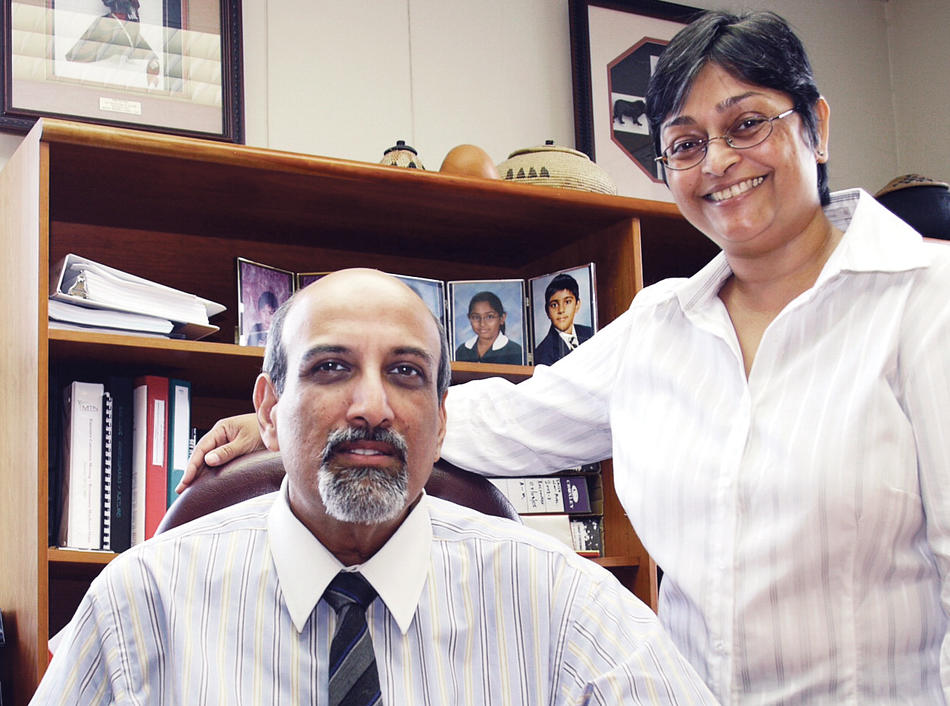There have only ever been two options for controlling the sexual transmission of HIV: abstinence and condoms. The first strategy is widely considered futile. The second is imperfect. In sub-Saharan Africa, for instance, few men use condoms regularly, even if condoms are free and readily available.
Women soon may be able to better protect themselves using a gel created by the husband-and-wife team of Salim S. Abdool Karim and Quarraisha Abdool Karim, professors of clinical epidemiology at Columbia’s Mailman School of Public Health. In a study that the Columbia professors finished this summer, the new anti-HIV gel was found to be safe and effective at lowering the chances of infection. If other researchers can repeat their findings soon, the gel will be the first of its kind to be made commercially available.
The Abdool Karims presented their findings at the annual International AIDS Conference in Vienna on July 20, the day after their paper appeared online in the journal Science. The audience erupted in cheers several times during their presentation and gave them a standing ovation at the end.
“I couldn’t believe the response,” says Salim S. Abdool Karim. “It was extremely emotional, I think, because we’ve finally found an approach that women can control.”
The new gel contains a common antiretroviral drug called tenofovir, which is typically taken in pill form to treat AIDS. The gel is different from others that have been created but abandoned as ineffective over the years in that its active ingredient seeps into the cells of the vaginal wall. Previous gels used drugs that attacked HIV only on the surface.
The two professors, who together also head the Centre for the AIDS Programme of Research in South Africa (CAPRISA), which is based in Durban, worked with several biotechnology organizations to make the gel using a supply of tenofovir donated to them by the California-based pharmaceutical company Gilead Sciences. The professors have negotiated a licensing agreement with Gilead that stipulates that the gel, if it’s approved by regulators, will be available to women throughout Africa at cost.
“Basically, our deal says that Gilead won’t take any profit from the production and sale of the drug in Africa,” says Salim. “It’s amazing that a drug company would agree to that.”
The Columbia professors, both of whom were born and raised in South Africa, tested the gel’s effectiveness in a study of 900 women in Durban and in a remote South African village between 2007 and 2010. They found that women who used the gel, compared to those given a placebo gel, were 39 percent less likely to become infected with HIV over a period of two and a half years. A woman’s chances of becoming infected were directly proportional to her diligence in using the gel. Those who used the gel at least 80 percent of the time they had sex, for instance, halved their chances of contracting HIV.
The scientists also made an unexpected discovery: The gel dramatically reduced a woman’s chances of contracting herpes. The Abdool Karims say this could be because tenofovir attacks viruses and both HIV and herpes are viral.
The gel isn’t intended to be an alternative to condoms, but rather a supplemental form of protection, the scientists caution. Nevertheless, it could have a significant impact: The researchers estimate that the gel could prevent 1.3 million HIV infections in South Africa alone by 2030, provided that rates of condom use remain level.
“For every 20 women using the gel, we’ve prevented one HIV infection,” says Salim. “That’s a pretty good rate of return.”
The professors hope that their gel will be commercially available within three years. One follow-up study is already being planned by other researchers to confirm the gel’s safety and efficacy.
“A benefit of using tenofovir is that it’s one of the most widely used drugs in the world, so its safety profile is already well known,” says Salim. “If our findings are confirmed, I think this could alter the course of the HIV epidemic.”



